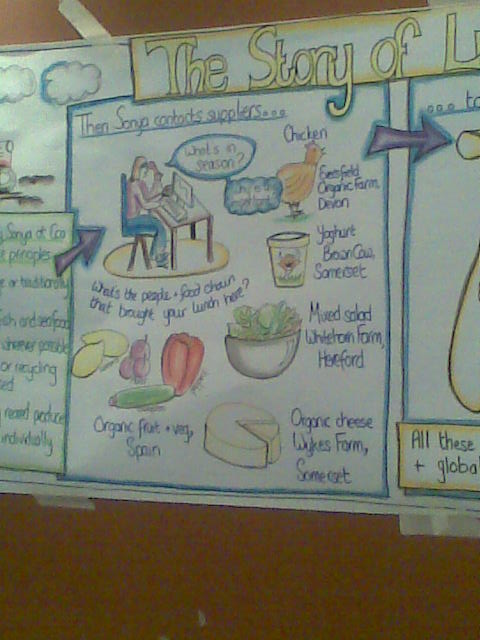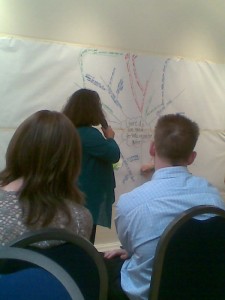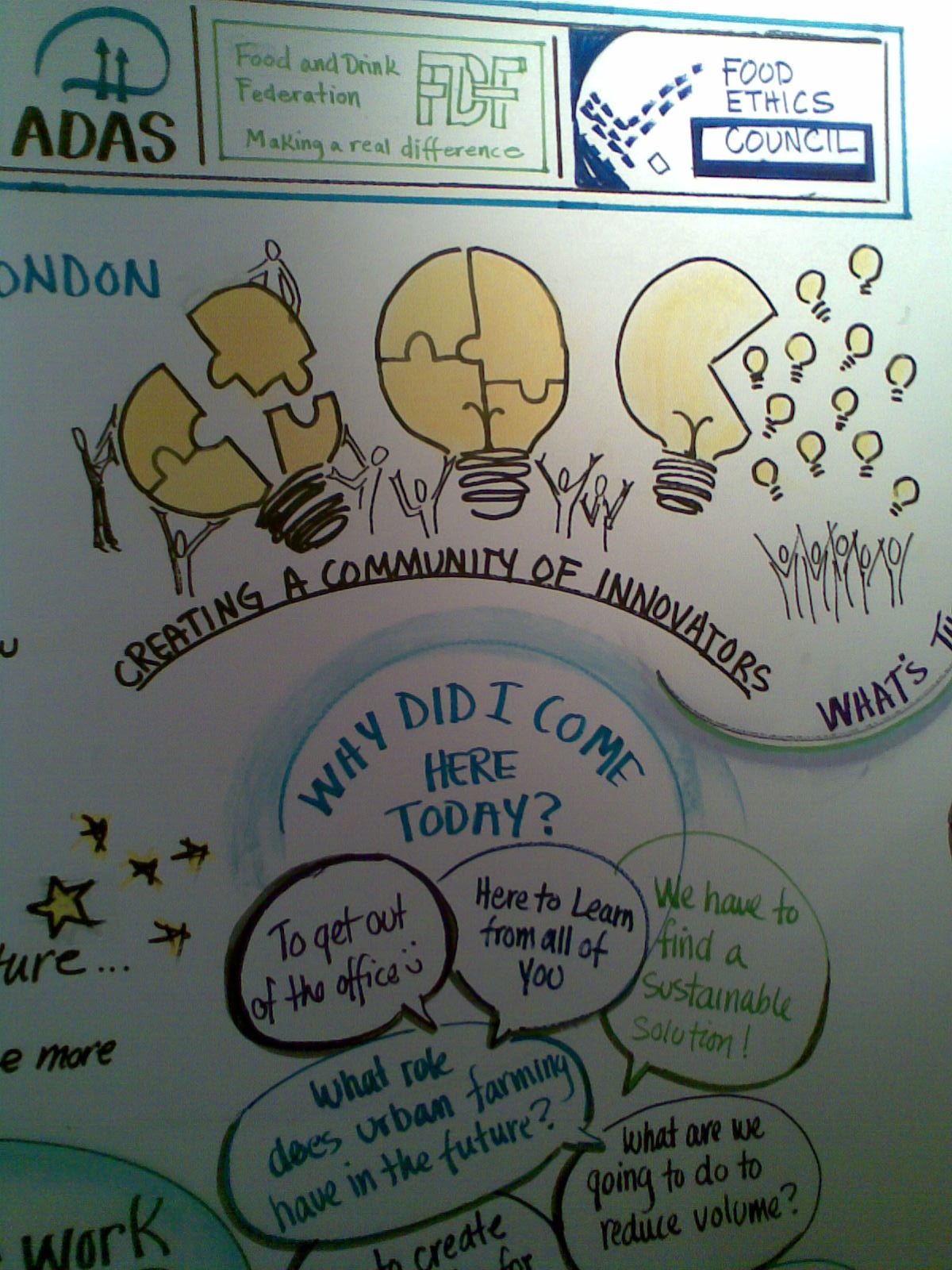Earlier this summer saw the launch of London-based Lawyers for NetZero, a peer network for in-house counsel. But which other unlikely professions are changing from the inside out?
Advice for the newly freelance
I have found myself having a lot of coffees with people who are on the path to self-employment. As someone who embraced this particular type of freedom over 16 years ago, I have a thing or two to say! Some of these neophytes have taken voluntary redundancy amidst organisational shake-ups. Others are responding to new caring responsibilities. Some have just tired of trying to change organisations from within.
I just love these conversations. It's great to be asked for advice on a subject dear to your heart and about which you think you have something useful to say. And it appeals to the coach in me: asking questions to draw out what they really want from the change: their dreams and ideals; boundaries and fixed points.
Advice from experienced freelancers
So I asked around on twitter and some linked in groups, and got some great responses.
Most were about networking for support and leads:
"It takes a long while to build consultancy relationships, so start early, and keep feeding in new possible clients to your portfolio so that you have always got an eye on one year from now as well as the now." Christine Garner
"I would suggest that your first piece of paid work (and your second...) will come from your network rather than any 'advertising' or external marketing you might do. The people who know you will be the ones to trust you first - and to tell others about you." Mark McKergow
"I was advised (many years ago) to have a great, but short, answer to the question, 'What do you do?' My answer was 'I'm a developer, I develop people!' That often prompted a deeper discussion led by the other person, that occasionally led to work. So much easier than a long ramble about what I actually did." David Shepherd, AMED member
"Start with the people you know, and build from there." Edward Kellow
"Reach out to friends and acquaintances in consultancies/agencies, become their associate. This will multiply ways you get work." Adam Garfunkel
"After 25 years in the field, I became self-employed 5 years ago. If I can summarize in one word, it is Contacts. Maintain and expand your list of contacts. Stay in touch with them, such as with a newsletter. Let them know you have your own firm and will give them the same level of service you have in the past (with perhaps, lower overhead). Get out there." Marc Karell, Climate Change & Environmental Services, LLC
"It could fill a book! But perhaps the most important lesson I learned was that going independent should not and does not mean going it alone! If the work does not involve other people, find other people to interact with around the work. Get a coach to help step outside the work and think. Join an association. Get associates. These things helped me not to be isolated and continue to help me infuse my work with new, creative ideas and insights, and to not spend all my time in my own head!" Chris Grieve
Some were about the kind of work you do, and how:
"Stay true to your own values [so you] project that you feel good about what you do" Christine Tuson
And some were very practical:
"Remember to invoice them and make sure they pay." Christine Garner.
"Work out what income you need and how much work (in paid days per year at different rates) you need to do to achieve it, and use that as a personal KPI." Christine Tuson
"Especially for women, don't charge too little." Julian Walker
And I can't resist linking to Sarah Holloway's blog post on the same topic, with her deeply practical "when you see a loo, use it".
Glass half full?
Some freelancers think their diary can never be too full, but I'd offer some contrasting advice on that point. I know I have a weakness in saying 'yes' too readily, so I have practised saying no and enjoying the downtime. It's time to spend with family, on community activity, or just clearing out the cupboard of mystery (everyone has one).
I'd agree more with these comments:
"Downshift. Make your home earn money. When you have gap days you don't need to panic, it may be better to take that as a reboot yourself day. Oh yes, and enjoy the freedom it gives you. Good luck." Nicola Baird
"Learn how to say no. when I first went freelance, I was terrified of ever saying no for fear of never getting work again, so found I over committed and worked silly hours. Took me years to have the confidence to say no." Pippa Hyam.
My advice
These are my top tips:
- Network, use your contacts, tell people you are available, ask them for help and ask them what help they need.
- Spend a little time daydreaming about your perfect, ideal work and then tell people that's what you do / what you're looking for.
- Trust your own judgement - if you don't seem to have the whole picture, keep asking questions; if the client seems to have missed something, mention it.
- Don't be scared of the money conversation - clients expect to have to talk about it!
- Know your own limits, be it term dates and sports day, or the sectors / kinds of creepy people you don't want to work with and stick to them - you are the boss!
- Do things that challenge you and get support from fellow independents.
- Find great places to have client or networking meetings for free - in London I like Kings Place and the Royal Festival Hall.
Networks
Over the years, I've got great support from a few organisations which are great for networking, both online and face-to-face: AMED; IAF; IEMA. I have also started to check out meet-ups - an online way to find and set up networking events. For example, I've gone along to collaboration meet-ups in London [update 5/5/16] and these facilitation meet-ups organised by the IAF. Check out what’s available in your area.
More advice, your advice?
Please do add your own experiences, questions or tips, in the comments below.
Looking for work?
Well done for finding this page! You have already shown tenacity, imagination and great googling skills. This practice doesn't offer work experience, apprenticeships or internships. We're not hiring at the moment. You need to find a slightly bigger organisation for that sort of thing.
Here's some advice and links, which I hope are helpful.
- Use your contacts - people you met while studying, both students and staff. Let them know what kind of work you are looking for and what you can offer.
- Join a relevant professional body and network like crazy: for environmentalists, IEMA is great. If you have found these pages because you're interested in facilitating then check out the IAF. And if you want to spread your wings into coaching, organisational consultancy and change management check out AMED.
- Linked-In is good too - look for active discussion groups related to your interests and location.
If you can afford it, look for volunteering or internship opportunities with organisations relevant to the kind of work you are interested in.
The field of change for sustainable development is one I have found exciting, challenging and satisfying. I hope you find a place here too.
Good luck!
Tasting the Future – tangy fresh process
As you may have noticed, I'm a process aficionado. I love to hear about innovative ways of helping people have the conversations they need. I love to try out new processes as a facilitator and a participant. I network with fellow facilitators through AMED, the IAF and a facilitators' group on linked-in. I read about unorthodox approaches, and sometimes I even try them with paying clients.
On Monday, I had the great treat of being a participant in someone else's workshop. There I saw for real - not in a training setting - open space, world cafe, graphic facilitation and live plenary mind mapping all used during the same meeting.
The event was the first 'assembly' for Tasting the Future, a collaborative whole-systems attempt to innovate the food system. It was organised by WWF, ADAS, the Food and Drink Federation and Food Ethics Council. Facilitation was provided by Hara Practice and Natural Innovation and other members of the hosting team. There were also some people doing graphic recording, from Intuitive Intelligence Training.
Some exciting conversations and actions emerged, and you can read more about them on the Tasting the Future ning. I'm going share some of the things I learned about process.
Dressing the room
When we arrived we sat where we liked at small tables covered with flip chart paper, with a small stack of coloured pens, crayons and chalk. There were small bowls of sweets and a colourful cartoon diagram introducing us to world cafe. And on each table there was a unique food or herb seedling, grown at Hackney City Farm, which you could buy to take home if you liked. Plants included apple mint, chamomile, lettuces, cabbage and tomato.
There was also this great picture story of our lunch: very appropriate for an event like this.
Setting the tone
There were a couple of phrases I scribbled down during the opening session. The hosting team asked us to be strong enough to work with our differences, to become a community of innovators, to speak with intention. We were invited to 'listen louder' if we disagreed with what someone was saying, so that we could better understand their perspective rather than blot it out with our own.
Meta-planning
Following couple of rounds of world cafe, we were asked to come up with our best ideas about what we wanted to change in the current system. We wrote these on A5 size stickies, and these were then meta-planned (clustered) in plenary. Bear in mind there were over 100 participants, and the facilitators among you will recognise the audacity of this. The hosting team had mikes and runners, and the lead facilitator began as usual by asking for any one idea. She then asked people with the same idea on their sticky note to shout 'snap!'. This was a great way of gathering up the clusters very rapidly. A supporter did the actual sticking up, while the facilitator asked for the next idea. It didn't take long for all the ideas to be gathered and clustered.
Whole group mind-mapping
Another daring bit of process for such a large group was the method used to identify topics for the subsequent open space session on action planning. We all gathered around a long wall, where a large blank area of paper was taped up.
The focus question was posed: "Where do we need to take action?". (Actually there was an adjective in there, but my memory and my photo have let me down. Could've been 'where do we need to take collective action' or 'urgent action'.) Then the facilitator asked us to write our name legibly on a sticky note if we had an idea we wanted to add to the mind map. Rules for the mind map included that there's no such thing as a bad idea, it's fine to disagree with a previous idea, and the owner of the idea gets to say where on the map it goes. There were support facilitators collecting up the names so the lead facilitator could call people by name. Other members of the team had mikes and ensured each person making a contribution could be heard. Two of the team were scribes, with four colours of marker pens. As a new theme and idea was added, the scribes would write it up on the evolving map.
One at a time, those who wanted to offered ideas for action, and said whether they were twigs to add to existing branches, or new branches. This went on for about 30 minutes. It was beautifully controlled, and everyone who wanted to had an opportunity to contribute.
When the mind map was complete, we were each given three dots and invited to use them to indicate which actions we thought were the most important. Over tea, the dots were counted and around a dozen action areas were identified which had enough support to be the topics for the subsequent open space action planning session.
Open space
Over tea the room was rearranged so there was one large circle in the middle. The topics which had emerged from the mind map were written up on large pieces of paper, each with a number which corresponded to a numbered part of the room. The method of sorting out who went to which session was simpler than I'd seen before. There was no signing up of participants to different topics, or assigning topics to time slots. Instead, there was one 50 minute time slot. Within that time, participants could go to whichever topic they wanted, and leave it whenever they wanted. This is the law of two feet. Topics were hosted by volunteer hosts, who put themselves forward while the open space was being organised. If a topic didn't have a host, it didn't run. There was also the opportunity for hosts to offer additional topics, and I think one was proposed at this stage.
Very soon we were ready to go to our spaces and discuss our topic. The host had a prepared flip where they were asked to record key information: topic title, who hosted, who participated, three key points to share and actions the group would take (if any). The guidance was very clear on actions: they were to be things someone in the group had agreed to take on, not recommendations for action by others. As the facilitator said "We're the ones we've been waiting for".
Graphic recording
As the day progressed, a team of graphic recorders captured the highlights in this lovely illustration.
Update
There have now been three Assemblies and other meetings and workshops as part of Tasting the Future. Check out the prospectus for more details.











